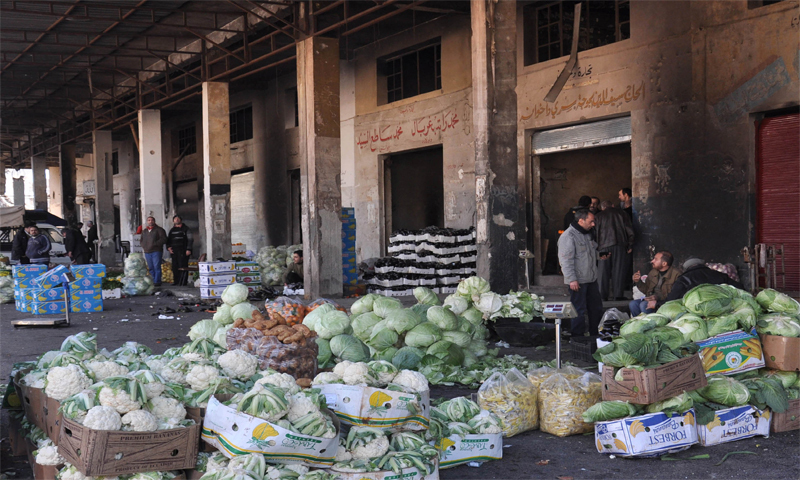Homs – Orwa al-Mundhir
“Hey ladies! Please do not start shopping before I am done,” Abu Mamoun, a greengrocer in the city of Talbiseh, north of Homs governorate, told some women who gathered at the door of his store to purchase what they needed. Abu Mamoun was busy transporting his stock of fruits and vegetables from his small car to his store.
Abu Mamoun, who is in his fifties, points out that he has to replace the price tags of his products almost every day, according to the grocery bills, which continue to climb this year.
“Every day new prices are set for vegetables and fruits” in Homs, Abu Mamoun told Enab Baladi, who likened the Hal wholesale market to the securities market or the stock exchange. This is because the produce market “is left without oversight and control. In addition, smuggling, exportation, temperatures and material abundance are all underlying factors,” affecting pricing decisions.
The prices of vegetables and fruits are expected to keep going up in Homs governorate for the Competition and Markets Authority fails to control prices set in the Hal wholesale market. Furthermore, fruits and vegetables are smuggled to Lebanon, which greatly contributes to the rise in commodity prices.
Smuggling vegetables under the auspices of “Hezbollah”
Homs governorate has two markets: one is located at the city entrance and provides Homs residents with vegetables and fruits. The other one is located in the west of the city near the village of Khirbet al-Sawdah.
Khirbet al-Sawdah’s market is controlled by a group of merchants working for both Hezbollah, and the security office of the 4th Armored Division, which directly supervises the smuggling of vegetables and fruits from the market to the Lebanese border, one of the Hal wholesale market merchants told Enab Baladi.
Khirbet al-Sawda’s market was, in fact, established when the armed opposition factions were controlling Homs. However, after the main wholesale market was restored, the governorate did not stop the buying and selling of vegetables and fruits in the market.
According to the merchant, most Khirbet al-Sawda’s wholesale market goods are intended to “go to smuggling under the protection of the members of the 4th Armored Division, according to the merchant, who spoke on the condition of anonymity for security reasons.
“At least 15 vehicles loaded with all types of vegetables and fruits are being smuggled from Khirbet al-Sawda’s market to Lebanon,” under the supervision of the security office of the 4th Armored Division, according to the merchant. Then, Hezbollah members work on discharging the goods inside the Lebanese borders.
The merchant estimates that about “one third of Homs’ farms production goes to smuggling,” which leads to an increase in the prices of vegetables and fruits in general.
A kilogram of tomatoes is close to 1,000 Syrian pounds (SYP-30 US cents), one kilogram of beans is bought for 2,000 SYP (60 cents).
A kilogram of onions costs around 500 pounds (15 cents), and one kilo of cucumbers is 1,500 pounds (46 cents), according to prices observed by Enab Baladi in the Hal wholesale markets of the governorate of Homs.
Poor living conditions fuel smuggling
The economic crisis in Lebanon worsened following the explosion of the Port of Beirut on 4 August 2020, which negatively affected the livelihood of citizens.
This resulted in a continuous spike in prices. In addition, the Lebanese government reduced the number of subsidized goods. And it also announced that it could lift subsidies on some essential goods. As a result, the Lebanese citizen has almost lost his purchasing power. All these factors together contributed to the declining middle class in Lebanon.
Smuggling has become more frequent between Syria and Lebanon, given worsening economic conditions in the two countries and the sanctions imposed on Syria. This includes smuggling food, fuel, and banned items. These operations bring significant financial benefits to smugglers. The Lebanese authorities, on the other hand, are working to curtain smuggling to and from Syria.











